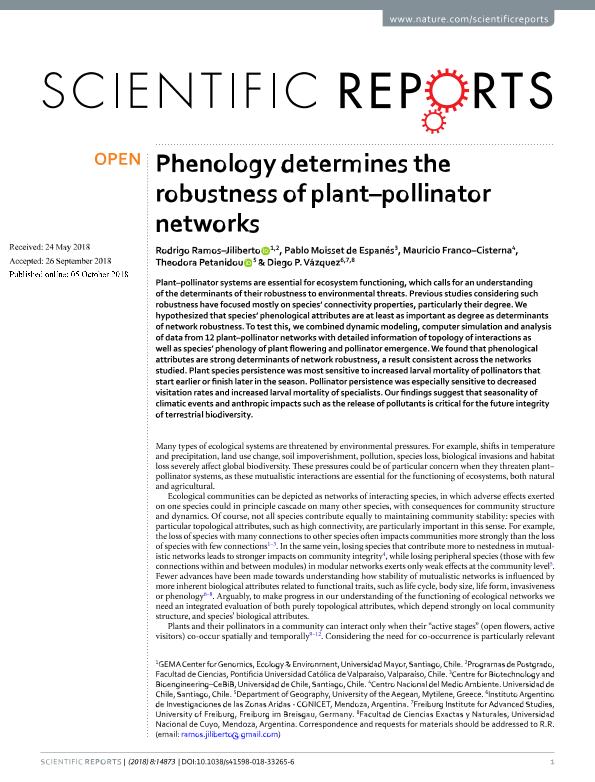Mostrar el registro sencillo del ítem
dc.contributor.author
Ramos Jiliberto, Rodrigo
dc.contributor.author
Moisset de Espanés, Pablo
dc.contributor.author
Franco Cisterna, Mauricio
dc.contributor.author
Petanidou, Theodora
dc.contributor.author
Vazquez, Diego P.

dc.date.available
2019-08-27T20:26:03Z
dc.date.issued
2018-12
dc.identifier.citation
Ramos Jiliberto, Rodrigo; Moisset de Espanés, Pablo; Franco Cisterna, Mauricio; Petanidou, Theodora; Vazquez, Diego P.; Phenology determines the robustness of plant–pollinator networks; Nature Publishing Group; Scientific Reports; 8; 1; 12-2018
dc.identifier.issn
2045-2322
dc.identifier.uri
http://hdl.handle.net/11336/82304
dc.description.abstract
Plant–pollinator systems are essential for ecosystem functioning, which calls for an understanding of the determinants of their robustness to environmental threats. Previous studies considering such robustness have focused mostly on species’ connectivity properties, particularly their degree. We hypothesized that species’ phenological attributes are at least as important as degree as determinants of network robustness. To test this, we combined dynamic modeling, computer simulation and analysis of data from 12 plant–pollinator networks with detailed information of topology of interactions as well as species’ phenology of plant flowering and pollinator emergence. We found that phenological attributes are strong determinants of network robustness, a result consistent across the networks studied. Plant species persistence was most sensitive to increased larval mortality of pollinators that start earlier or finish later in the season. Pollinator persistence was especially sensitive to decreased visitation rates and increased larval mortality of specialists. Our findings suggest that seasonality of climatic events and anthropic impacts such as the release of pollutants is critical for the future integrity of terrestrial biodiversity.
dc.format
application/pdf
dc.language.iso
eng
dc.publisher
Nature Publishing Group

dc.rights
info:eu-repo/semantics/openAccess
dc.rights.uri
https://creativecommons.org/licenses/by-nc-sa/2.5/ar/
dc.subject
Phenology
dc.subject
Plant-Pollinator Networks
dc.subject
Stability
dc.subject.classification
Ecología

dc.subject.classification
Ciencias Biológicas

dc.subject.classification
CIENCIAS NATURALES Y EXACTAS

dc.title
Phenology determines the robustness of plant–pollinator networks
dc.type
info:eu-repo/semantics/article
dc.type
info:ar-repo/semantics/artículo
dc.type
info:eu-repo/semantics/publishedVersion
dc.date.updated
2019-08-01T20:25:00Z
dc.journal.volume
8
dc.journal.number
1
dc.journal.pais
Reino Unido

dc.description.fil
Fil: Ramos Jiliberto, Rodrigo. Pontificia Universidad Católica de Valparaíso; Chile. Universidad Mayor; Chile
dc.description.fil
Fil: Moisset de Espanés, Pablo. Universidad de Chile; Chile
dc.description.fil
Fil: Franco Cisterna, Mauricio. Universidad de Chile; Chile
dc.description.fil
Fil: Petanidou, Theodora. University Of The Aegean; Grecia
dc.description.fil
Fil: Vazquez, Diego P.. Consejo Nacional de Investigaciones Científicas y Técnicas. Centro Científico Tecnológico Conicet - Mendoza. Instituto Argentino de Investigaciones de las Zonas Áridas. Provincia de Mendoza. Instituto Argentino de Investigaciones de las Zonas Áridas. Universidad Nacional de Cuyo. Instituto Argentino de Investigaciones de las Zonas Áridas; Argentina. Universidad Nacional de Cuyo. Facultad de Ciencias Exactas y Naturales; Argentina. Universität Freiburg Im Breisgau; Alemania
dc.journal.title
Scientific Reports
dc.relation.alternativeid
info:eu-repo/semantics/altIdentifier/url/https://www.nature.com/articles/s41598-018-33265-6
dc.relation.alternativeid
info:eu-repo/semantics/altIdentifier/doi/http://dx.doi.org/10.1038/s41598-018-33265-6
Archivos asociados
